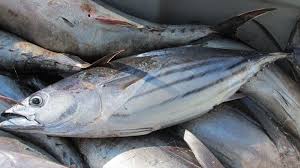The Marine Stewardship Council (MSC) has published version 3.0 of its fisheries standard, meaning fisheries entering MSC assessment for the first time have until May 2023 to adhere to the new standard, while certified fisheries have six years to come into compliance.
MSC’s standard review and uupdate, considered the most-comprehensive ever done by the organisation, began in 2018 and has important implications for tuna fisheries.
Recent data published by MSC found over 47 percent of the world’s wild commercial tuna harvest is labeled as MSC-certified. This equates to over 2 million metric tons of tuna annually, spread across more than 430 brands that are using the MSC label, up from 126 brands in 2015. MSC named several companies it said were instrumental for this growth, includin Lidl Germany, Walmart, and American Tuna, Bolton Group, Princes, and Tesco.
As part of MSC’s mission towards safeguarding the oceans, data published in MSC’s “Sustainable Tuna Handbook” found 38 conditions of certification were delivered on by MSC-certified tuna fisheries within three years to March 2022. The Fisheries Standard Version 3.0 includes major changes that impact tuna fisheries, in which a recent published brief, “MSC Fisheries Standard Version 3.0: Considerations for Tuna Fisheries,” outlines several of these impacts.
“The new MSC fisheries standard will ensure that certified fisheries remain world leaders in sustainable fishing. Certified tuna fisheries will now be required to deliver a set of defined milestones aimed at securing agreement between multiple national governments to implement state-of-the-art harvest strategies derived through open and fair negotiations,” MSC Chief Science and Standards Officer Rohan Currey said. “These requirements represent a significant increase in expectations of fisheries managed by RFMOs and will create a unified and powerful push towards ensuring vital protections are agreed that ensure sustainable management of tuna stocks in perpetuity.”
RFMO-managed fisheries will be expected to implement robust harvest strategies within a set timeline that includes progressive milestones along the way, MSC said. Harvest strategies must be agreed upon through a management strategy evaluation – a collaboration between NGOs, scientists, and industry that uses a computer simulation to find a management strategy that will achieve sustainable catch levels.
As a result of the new requirements, 33 global tuna fisheries are facing suspension, as the Western Central Pacific Tuna Commission (WCPFC) has been unable to develop harvest strategies for many controlled tuna species. MSC said it hopes to catalyse a breakthrough in WCPFC negotiations on harvest strategies by providing an opportunity for those fisheries to remain certified past June 2023 as an incentive to working on a deal.
Beyond RFMO-managed fisheries, other required improvements for tuna fisheries include stronger requirements on fish-aggregating devices (FADs); shark-finning; bycatcy of endangered, threatened, and protected (ETP) species; and implementing effective monitoring, control, and surveillance of wild-catch fisheries.
For certified fisheries, MSC is providing an opportunity for early application of its harvest strategy requirements. MSC said although this will lead to increased expectations with certain fast-tracked requirements, the early applicants will be given five years to secure harvest strategies for their target tuna stocks. In order to apply early, there must be majority agreement in fisheries targeting the same stock and by the next reassessment date of the fishery, it will be assessed against the MSC’s version 3.0 standard.
SOURCE: SEAFOOD SOURCE/PACNEWS















